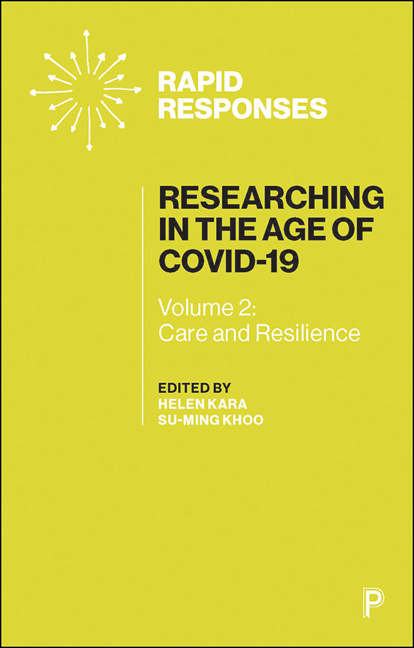6 - Ensuring no Voices are Left Behind: the use of Digital Storytelling and Diary Writing in Times of Crisis
Published online by Cambridge University Press: 23 March 2021
Summary
Introduction
When COVID-19 spread to the Middle East and North Africa (MENA) region, it became clear that government responses including lockdowns, school closures and social distancing measures would have a significant impact on adolescent lives. A lack of basic services and restrictions on work meant the most vulnerable households struggled to meet basic needs such as food and healthcare. Limited mobility and increased intra-household violence were also a concern, especially for girls and young women. At a community level, limited social cohesion between refugees and host communities is fraying further.
Gender and Adolescence: Global Evidence (GAGE) is a longitudinal research project that began in 2015, looking at what works to enhance adolescent capabilities and empowerment across low-and middle-income countries, including three contexts in the MENA region (Jordan, Lebanon and the Gaza strip). The GAGE methodology includes in-depth interviews, focus groups and participatory research activities that are traditionally undertaken face to face; driven by the COVID-19 pandemic, a range of virtual qualitative methodological tools were introduced by researchers. This chapter reflects on the significance of an ‘ethic of care’ in research undertaken in crisis contexts, and the practical and ethical strengths this principle lent to digital storytelling and audio and written diaries.
Background: virtual methods and young people
The COVID-19 pandemic has generated exceptional circumstances for research in lower-and middle-income countries, with traditional face-to-face methods no longer viable nor ethically justifiable. Yet understanding the impact of the pandemic on young people in these contexts is essential for knowing how to target effective support. Innovative strategies have therefore been needed in order to be able to continue research with vulnerable young people. The growth and use of the internet by young people in the MENA region has been well documented (Gunter et al., 2016), as has the way that interaction with technologies such as smartphones, tablets and other devices shape young people's engagement with their physical and social surroundings (Ergler et al., 2016). Recognizing that these same virtual technologies can also be deployed to capture the contemporary lived experience in ways that may resonate with young people, a growing body of work explores the utility, ethical challenges and considerations around virtual and online qualitative methods (Ardoin et al., 2016; Ergler et al., 2016; Volpe, 2019).
- Type
- Chapter
- Information
- Researching in the Age of COVID-19Volume II: Care and Resilience, pp. 68 - 77Publisher: Bristol University PressPrint publication year: 2020
- 1
- Cited by



